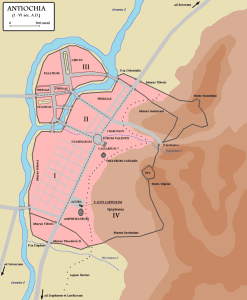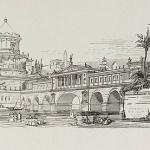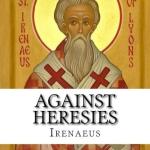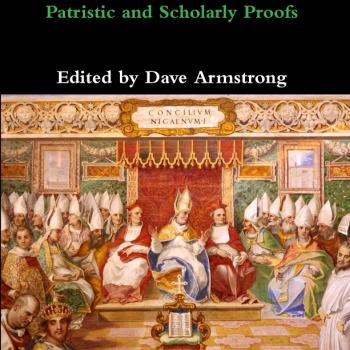“Please Hit ‘Subscribe’”! If you’ve received benefit from this or any of my 4,500+ articles, please follow this blog by signing up (email address) on the sidebar to the right, above the icon bar, “Sign Me Up!”: to receive notice when I post a new blog article. This is the equivalent of subscribing to a YouTube channel. Please also consider following me on Twitter / X and purchasing one or more of my 55 books. All of this helps me get more exposure and concretely supports my full-time apologetics work. Thanks so much and happy reading!
*****
[I will be citing from his work, To Autolycus, which consists of three books]
I believe, obedient to God, whom, if you please, do you also submit to, believing Him, . . . He who gave the mouth for speech, and formed the ear to hear, and made the eye to see, will examine all things, and will judge righteous judgment, rendering merited awards to each. To those who by patient continuance in well-doing [Romans 2:7] seek immortality, He will give life everlasting, joy, peace, rest, and abundance of good things, which neither has eye seen, nor ear heard, nor has it entered into the heart of man to conceive. [1 Corinthians 2:9] But to the unbelieving and despisers, who obey not the truth, but are obedient to unrighteousness, when they shall have been filled with adulteries and fornications, and filthiness, and covetousness, and unlawful idolatries, there shall be anger and wrath, tribulation and anguish, [Romans 2:8-9] and at the last everlasting fire shall possess such men. Since you said, Show me your God,
this is my God, and I counsel you to fear Him and to trust Him. [Bk I, ch. 14]
For as the sea, if it had not had the influx and supply of the rivers and fountains to nourish it, would long since have been parched by reason of its saltness; so also the world, if it had not had the law of God and the prophets flowing and welling up sweetness, and compassion, and righteousness, and the doctrine of the holy commandments of God, would long before now have come to ruin, by reason of the wickedness and sin which abound in it. And as in the sea there are islands, some of them habitable, and well-watered, and fruitful, with havens and harbours in which the storm-tossed may find refuge — so God has given to the world which is driven and tempest-tossed by sins, assemblies — we mean holy churches — in which survive the doctrines of the truth, as in the island-harbours of good anchorage; and into these run those who desire to be saved, being lovers of the truth, and wishing to escape the wrath and judgment of God. And as, again, there are other islands, rocky and without water, and barren, and infested by wild beasts, and uninhabitable, and serving only to injure navigators and the storm-tossed, on which ships are wrecked, and those driven among them perish — so there are doctrines of error— I mean heresies — which destroy those who approach them. For they are not guided by the word of truth; but as pirates, when they have filled their vessels, drive them on the fore-mentioned places, that they may spoil them: so also it happens in the case of those who err from the truth, that they are all totally ruined by their error. (Bk. II, ch. 14)
The disposition of the stars, too, contains a type of the arrangement and order of the righteous and pious, and of those who keep the law and commandments of God. For the brilliant and bright stars are an imitation of the prophets, and therefore they remain fixed, not declining, nor passing from place to place. And those which hold the second place in brightness, are types of the people of the righteous. And those, again, which change their position, and flee from place to place, which also are called planets, they too are a type of the men who have wandered from God, abandoning His law and commandments. (Bk. II, ch. 15)
God . . . placed man in Paradise, as has been said, to till and keep it, . . . by the expression, till it,
[Gen 2:15] no other kind of labour is implied than the observance of God’s command, lest, disobeying, he should destroy himself, as indeed he did destroy himself, by sin. (Bk. II, ch. 24)
. . . if he should incline to the things of immortality, keeping the commandment of God, he should receive as reward from Him immortality, . . . For God made man free, and with power over himself. That, then, which man brought upon himself through carelessness and disobedience, this God now vouchsafes to him as a gift through His own philanthropy and pity, when men obey Him. For as man, disobeying, drew death upon himself; so, obeying the will of God, he who desires is able to procure for himself life everlasting. For God has given us a law and holy commandments; and every one who keeps these can be saved, . . . (Bk. II, ch. 27)
And they also taught us to refrain from unlawful idolatry, and adultery, and murder, fornication, theft, avarice, false swearing, wrath, and every incontinence and uncleanness; and that whatever a man would not wish to be done to himself, he should not do to another; and thus he who acts righteously shall escape the eternal punishments, and be thought worthy of the eternal life from God. (Bk. II, ch. 34)
But all these things will every one understand who seeks the wisdom of God, and is well pleasing to Him through faith and righteousness and the doing of good works. For one of the prophets whom we already mentioned, Hosea by name, said, Who is wise, and he shall understand these things? prudent, and he shall know them? For the ways of the Lord are right, and the just shall walk in them: but the transgressors shall fall therein.
[Hosea 14:9] (Bk. II, ch. 38)
Related Reading
*
*
***
*
Practical Matters: Perhaps some of my 4,600+ free online articles (the most comprehensive “one-stop” Catholic apologetics site) or fifty-five books have helped you (by God’s grace) to decide to become Catholic or to return to the Church, or better understand some doctrines and why we believe them.
Or you may believe my work is worthy to support for the purpose of apologetics and evangelism in general. If so, please seriously consider a much-needed financial contribution. I’m always in need of more funds: especially monthly support. “The laborer is worthy of his wages” (1 Tim 5:18, NKJV). 1 December 2021 was my 20th anniversary as a full-time Catholic apologist, and February 2022 marked the 25th anniversary of my blog.
PayPal donations are the easiest: just send to my email address: [email protected]. Here’s also a second page to get to PayPal. You’ll see the term “Catholic Used Book Service”, which is my old side-business. To learn about the different methods of contributing (including Zelle), see my page: About Catholic Apologist Dave Armstrong / Donation Information. Thanks a million from the bottom of my heart!
*
***
Photo credit: Cristiano64 (10-16-10). Map of ancient Antioch, where Theophilus was a bishop [Wikimedia Commons / Creative Commons Attribution-Share Alike 3.0 Unported license]
Summary: Theophilus (d. c. 180), patriarch of Antioch, denied the novel Protestant doctrine of “faith alone” or sola fide, like — scholars tell us — all of the Church fathers did.














